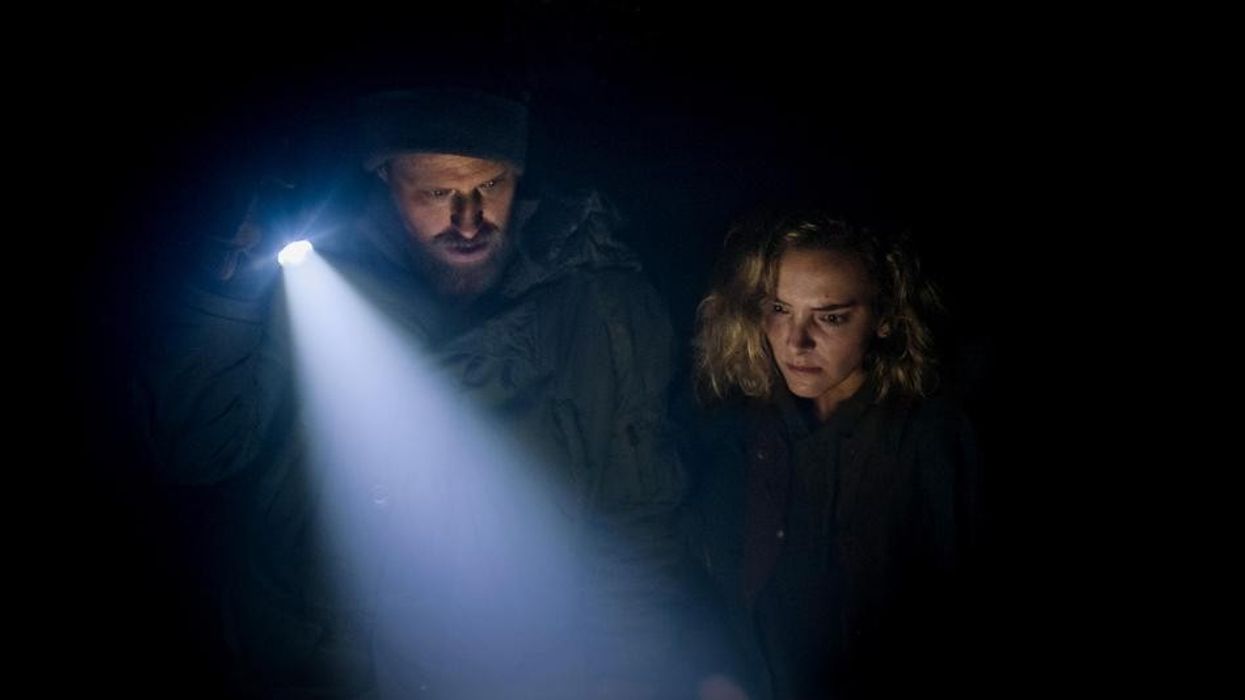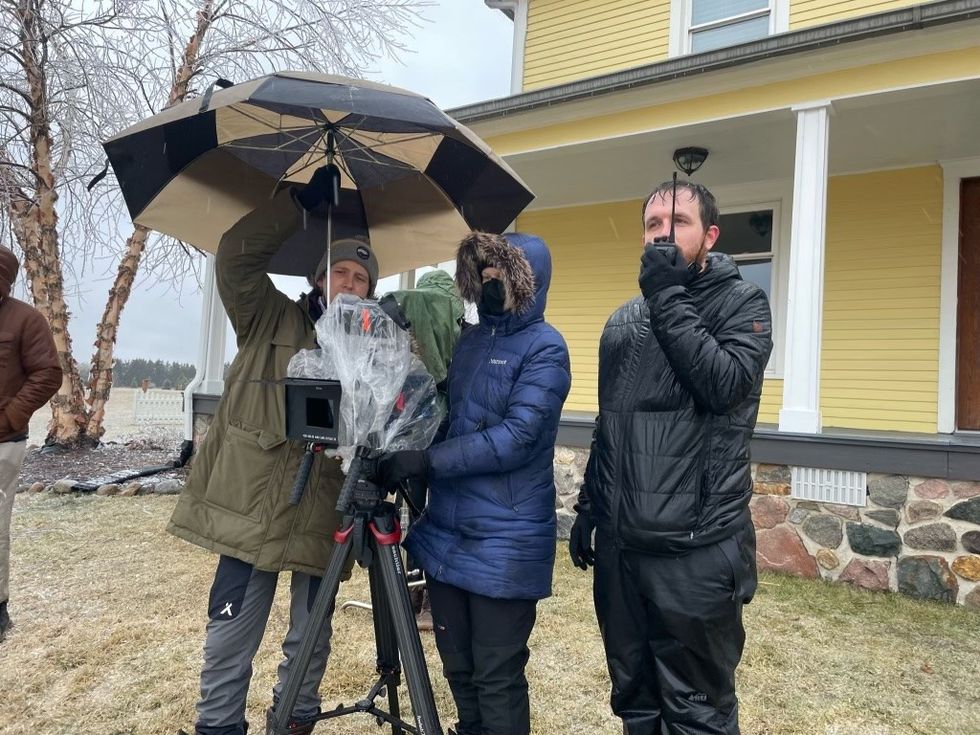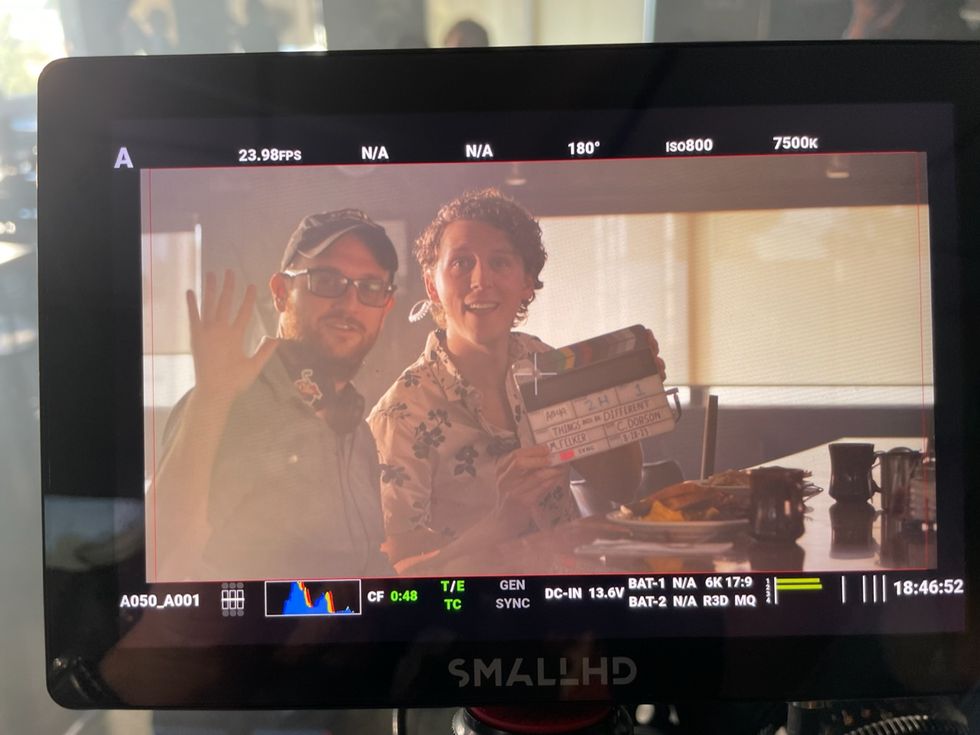Explore the Anatomy of a Time Travel Thriller With This SXSW Filmmaker
An interview with Things Will Be Different filmmaker Michael Felker about how the trick to time travel is in the answers you don’t give.

Things Will Be Different SXSW
Making its world premiere at the 2024 SXSW Film Festival, Michael Felker’s heady, sci-fi thriller Things Will Be Different is a perfect continuation of a budding indie film time travel genre that has found a home over the years at fests like SXSW and Sundance.
Telling the story of two estranged siblings who hide out in an abandoned farmhouse that transports them to a different time, the story is full of interesting twists and turns that keep you asking continuously more questions.
We sat down with Felker to talk about how he was able to conceive and plan his film, as well as offer any tips he might have for other aspiring indie filmmakers looking to concoct their intricate time travel features.
No Film School: So tell us how Things Will Be Different came about. What drew you to write and direct a sci-fi time-traveling tale like this?
Michael Felker: I think for me it just comes from the fact that I grew up watching a lot of sci-fi with my dad. His background is in engineering, so he's processes movies with a logical mindset. He ingrained that same type of thinking into me when I was younger and watching movies with him. I especially loved watching sci-fi films and time travel movies [with him].
Half the time I watch a sci-fi movie, I either call him to talk about it. Or, if we watch it together, we go to coffee afterward and just talk about the different theories, mysteries and see if we could piece together the movie’s puzzles. That's just like half the fun for us. So when conceiving this movie, Things Will Be Different, which does have a lot of time travel elements, that post-movie coffee talk was important to me.
I always wanted to shoot a movie at this abandoned farm we have in Michigan. It just sits there unused and one day, I was finally just like, “ want to make a cool feature there.” So my dad and I just started spitballing ideas about what to shoot, and we came up with this movie that's just about brother and sister bank robbers who hide out in a safe house that hides them away in a different time.
One of the mantras I have now when writing movies is that one of the best weapons you can have as an indie filmmaker is to make something that you've never seen before. And I'd never seen a movie where people go hide in a safe house that takes them to a different time before. My dad never saw that before either. That could lead to so many different possibilities. So, starting from there, the rest of the movie continued to move forward starting with that unique nugget.

Adam David Thompson, Riley Dandy, Carissa Dorson (DP), and Michael Felker
Via Michael Felker
No Film School: In a practical sense, how does one come up with the different timelines needed for a time-travel thriller movie? How did you plan things out for the story of the film?
Michael Felker: For my process, I just started planning it all in my head and then did a lot of vomit drafts. I wrote a vomit draft for this thing in six weeks, which was just me going like, “Here are the big eight things I want to hit with these characters and what they're going through in their minds,” and then I revised and refined the script about a dozen times until it felt right.
The big backbone to this type of outline was that we could shoot at this farm year round. So we were able to go there in the winter to shoot this snowy, cold, bleak palette, and then we knew we could come back to the same location in the summer to shoot when it’s just lush, green, and full of tall crops. Having that at our disposal, even though it's very unwieldy to shoot in these blocks, it helped us plan out some cool visual effects and magic tricks. So when we did come up with these time travel rules and where we needed to go, we came up with a lot of ideas with that backbone in mind.
But I didn’t write all the rules down on a whiteboard or anything. I didn’t have the urge to spell them all out. I just felt that if I saw them all on the board like that it would take so much away from those coffee shop talks that could happen afterwards. So I kept a little bit of that mystery in the ether where I'm like, “Here's my theory of what is happening in my universe and I don't want to spell it out quite yet."
No Film School: You’ve worked quite a bit as an editor before writing and directing this feature, can you tell us a bit about your professional journey and what you brought with you to this film?
Michael Felker: Yeah, I've worked as an editor more than anything. I've done it since I was in high school. I guess that's where the No Film School thing latched on for me was that I got a little bit of education on how to work Final Cut Pro 7 on my own. I played around a lot with Final Cut Pro when I got a really bad MacBook laptop back in high school, and my friends and I were just bored. I'm from Alabama and a lot of things close at 9:00 PM so we just snuck out of our houses and made movies all the time.
And so I learned that the most fun part of filmmaking and what makes filmmaking special is the editing process. It's where half the magic comes from and you don't even see it. So I did a lot of really bad fake fan film stuff. I remember I did one where I pretended I was Indiana Jones breaking into a Walmart, and then we cut that together overnight.
When I came out to LA, my first job was as a PA on this indie movie that was done by Justin Benson and Aaron Moorhead called Resolution. They hired me out and were like, “Here's some money, here's a place to sleep. Let's go make a movie in the woods with eight people.” We were all staying at this summer camp during its off-season and making the movie at a place just down the road. And when I'd go see them after the set in their bunk beds, they would just be editing the dailies immediately. They would just start an assembly and go from there. And I was just like, “This is incredible; this is just like high school all over again.” And so after that, I just got more into editing. I worked as an assistant editor in reality TV and I then started working for Benson and Moorhead as an assistant editor, then eventually as an editor on all their stuff.
And it's one of the most creatively fulfilling things you could do in this industry. It's a lot of tech mumbo jumbo. It's a lot of barriers to entry where you just sit there and go like, “I don't know how to do things.” At first, it feels like trying to drive a truck with a keyboard. You have no idea what's going on. But my upbringing was starting from there, playing with editing as much as I could, and I fell in love with it even more.

Jacob Rosenthal (producer), Carissa Dorson (DP), and Michael Felker
Via Michael Felker
No Film School: How have you found your editing work informs your writing and directing work these days? What helped you out most with this film?
Michael Felker: Well, when I first moved out to LA, I had some internships at a couple of places where I was reading scripts and seeing if I wanted to work in the development side. And what I realized early on is that I hate reading scripts. I think scripts are very much reading blueprints and they don't feel like a movie. They're an important step in the filmmaking process, and I understand that, but a lot of the editing that I've done tells me how a movie really should feel and flow and I inform that when writing scripts. So if anyone ever does read a script of mine or when I direct it, I just write it like you’re watching an edit.
And then when it came to directing the movie, especially when we came across production woes and stuff like that, I was able to lean back into my editing instincts and go like, “What do I really need?” I then started cutting in my mind to save money and time because we got behind from X, Y, and Z. I eventually became known on the set as the “editing director.” So much so, that the crew gifted me a katana on our winter production wrap. They gave me a sword that they got from a truck stop around there and they said something like “You're just like the cutting man. You're the cutting director.”
I feel like that's incredibly important, especially if you're working in indie features. We have no time and no money to do everything. Sometimes you need to know that you don't need to shoot a whole scene's worth of coverage. You just gotta be like, “I know that this is the closeup I need. I don't need all the lines around it. I have the confidence. I'm already making my decision here.”
No Film School: Speaking about production and shooting the film, can you tell us what camera you shot on and what your workflow was for it?
Michael Felker: Yeah, so we had two cameras. An A and a B and they both did different things for us. Specifically, I grew up with RED cameras, so we used a Komodo RED as our A camera. It's very post-friendly. I know the workflows. I've worked on it with every movie that I've also edited quite a bit with it too.
Our second camera was our specialty camera. It was a Panasonic LUMIX that was very small and that our DP loved. It's a small camera that did all these specialty shots that were very subjective, like shooting these memory shots. It's a very intimate camera that has specific things that you can do that don't feel so obtrusive with a RED. We even enhanced the subjectivity by using a lens baby on the LUMIX that allowed us to get this tilt-shift vaseline look around the edges.

Michael Felker and Jacob Rosenthal (producer)
Via Michael Felker
No Film School: It looked like those memory shots in The Assassination of Jesse James.
Michael Felker: That was one of our references. We watched a lot of that in Assassination, and was just like, “Wow, we just love this look that's happening here.” It gave us the idea that even the camera was thinking about things, remembering them, and piecing together what the movie means. So yeah, it was incredible. Glad you caught it.
No Film School: What other films inspired this project? Did you take inspiration from any other time-traveling films or books or anything?
Michael Felker: Yeah, I mean I love The Matrix. It wasn't an inspiration exactly, but it's always an influence on me, especially in what ways you could push the medium. It was one of the first movies I saw that got me into movies. It made me feel like I can push through multiple frontiers, not just in storytelling and what the script's about, but how you shoot things. And that movie is always my mantra whenever you make a movie, just try one thing you've never done before.
But for this movie specifically, there are three movies. Two of them came from forming a pitch, but there's a third movie that's a good companion piece that I thought about later. The first two movies were Looper and Blood Simple.
Looper is an incredible concept that shows a lot of lore beyond special effects. It’s very economical, because Looper is just a time travel movie that mostly just shows people with guns. You got a futuristic bike here, a telekinesis trick there, but the ideas and the concepts are so primal and raw on film. It's great editing, it's great practical makeup. It’s getting people doing stuff at just different times of day so to speak.
And then Blood Simple I think is just one of the most fun movies of all time. You have moment-to-moment things happening in that movie that genuinely surprise you. All the characters act with their guts and instincts that causes these crazy rippling repercussions and it’s incredibly entertaining but also very true to human nature.
And then the third movie that came up after writing the script that my lead actor Adam mentioned when he read the script, and I love this movie, is Timecrimes which came out in 2007. It's a low-budget horror sci-fi about a man who discovers a time machine on his land. And he's stuck in these infinite loops as he's trying to fix things that he did and inadvertently stopping something that may or may not be caused by him from another timeline... It's a maddeningly wonderful movie that is done basically on a plot of land with a couple of people and it’s incredibly fun and bewildering.
No Film School: All right, one final question. What advice do you have for any other filmmakers possibly wanting to explore time-travel projects?
Michael Felker: Just make things and then learn from your mistakes. There are mistakes I made and things I learned in this movie and there will be mistakes I make and things that I'll learn for the next one, but just go make those mistakes. Take your camera out, and see what good lighting can do, and what bad lighting could. How do you fix that? How do you shape that? Start trying crazy tricks, especially if you're in a sci-fi thriller. Start playing around with tricks, especially as an editor.
A lot of the greatest movies ever made involve getting creative with editing. So get into editing any way you can. Just go out there, fall on your face, fall on your face over and over and over and over again. Be proud that you're doing it and if you still love it, after all of it, you'll eventually make something so freaking cool. And it starts with you just doing anything you can with maybe $0 and go from there.
- SXSW Announces 2023 Jury and Special Awards ›
- 'Forever Now': The Heartbreaking Short That Won SXSW Was Entirely Improvised ›
- So You Got Rejected By Sundance. Now What? ›
- Why SXSW 'Easy Living' Director Shot with 2 Cameras ›
- 'I Am Another You': How SXSW Award-Winner Nanfu Wang Finds the Extraordinary in the Ordinary ›
- 97 SXSW Filmmakers Give You Advice on Making Better Movies ›
- Exploring the Cameras at the 2024 SXSW Film & TV Festival ›
- SXSW Announces Award Winners from the 2024 Film & TV Festival ›
- Editor Patrick Walsh on creating SXSW Film “The Uninvited” with Adobe Premiere Pro ›
- SXSW 2024 Roundup: Challenges and Advice From The Filmmakers ›
- SXSW 2024 Roundup: Challenges and Advice From The Filmmakers ›
















